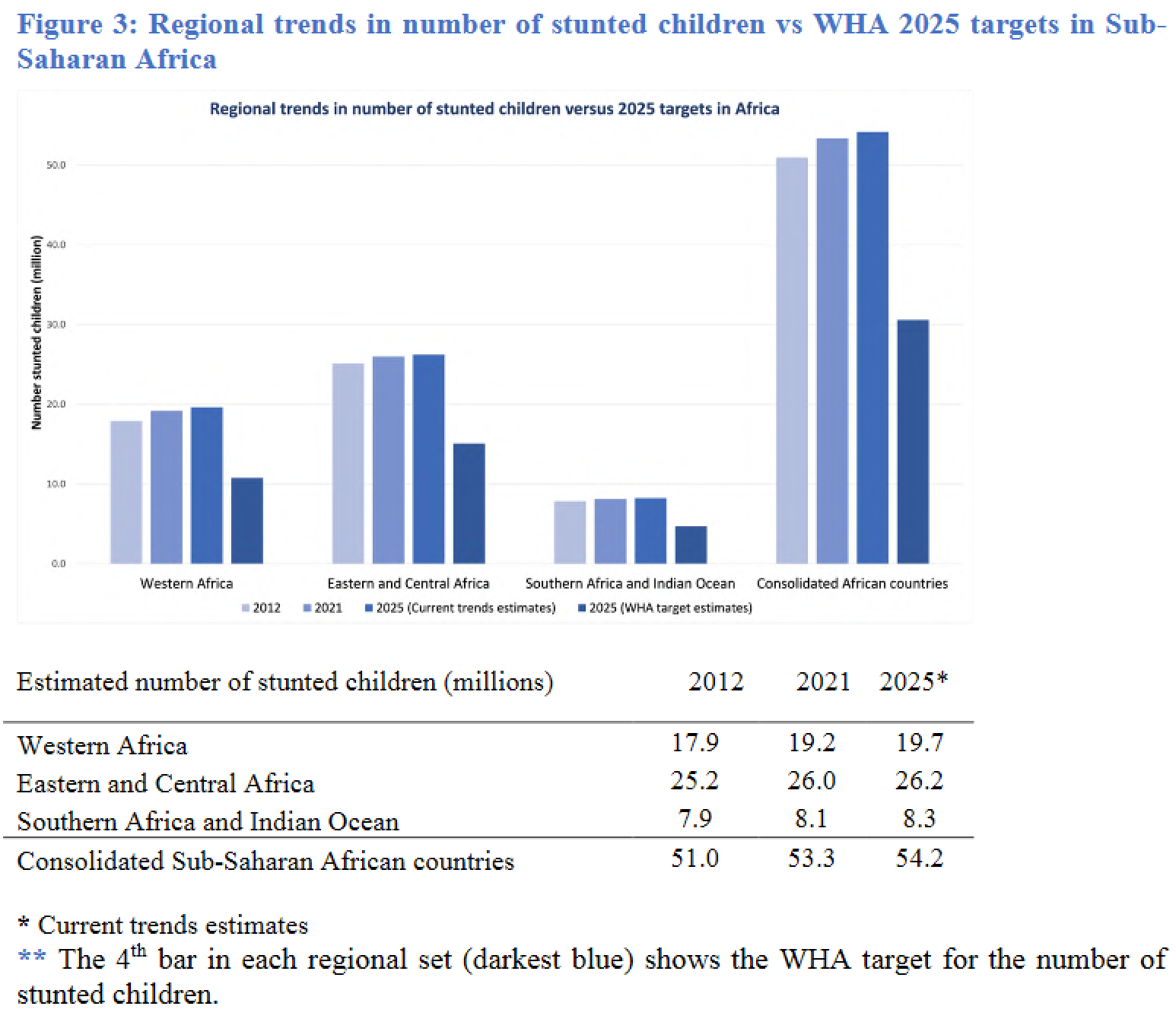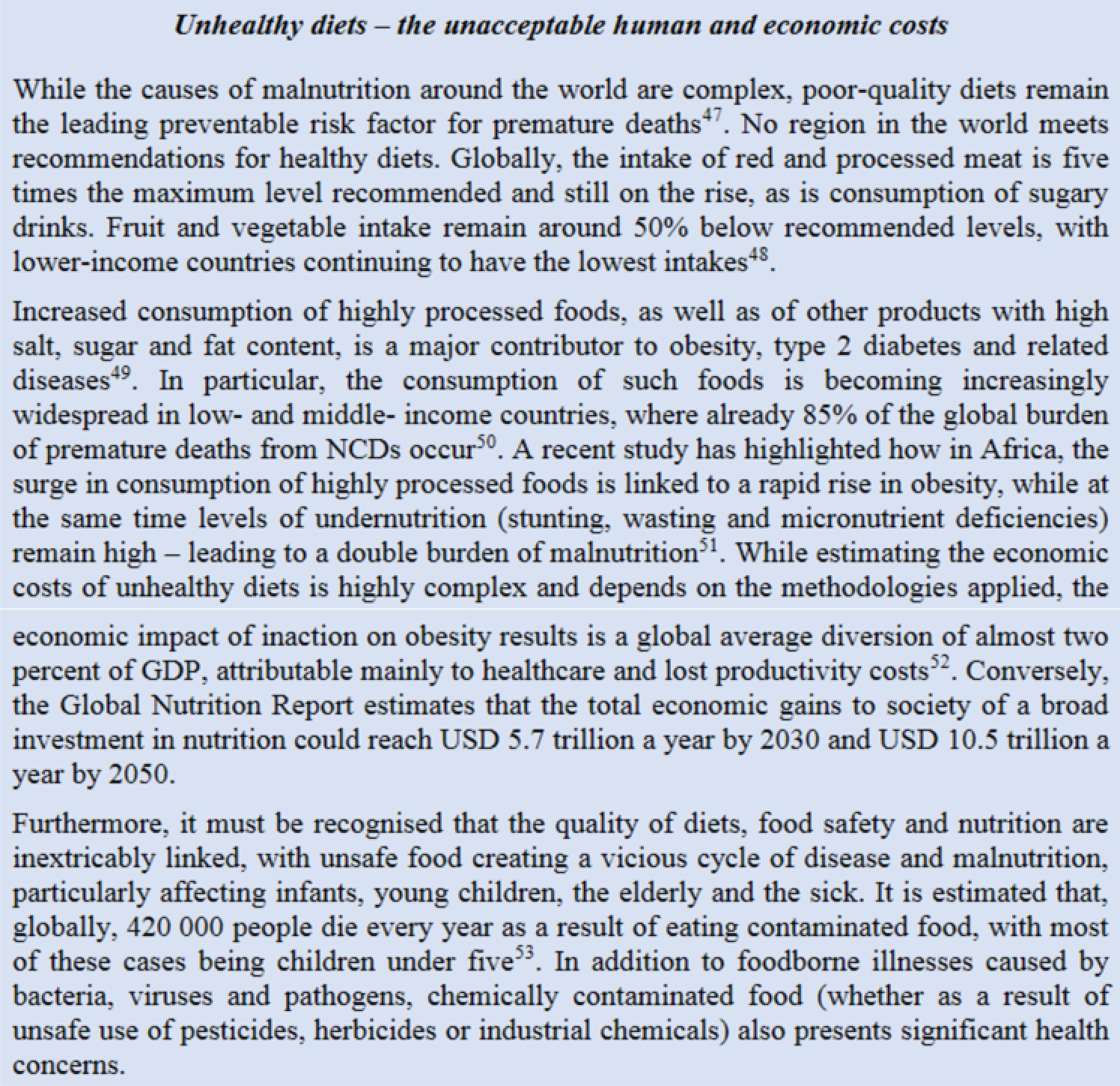Key messages
With the new programming cycle for 2021-2027 now under implementation, the seventh progress report provides an opportunity for closure with respect to the EU’s ambitious 2013 pledge to allocate EUR 3.5 billion to nutrition between 2014 and 2020. The annual resource tracking exercise presented here confirms that by 2020 the EU had committed over EUR 4.3 billion for nutrition, EUR 835 million more than was originally pledged. Of this amount EUR 2.8 billion went to development and EUR 1.5 billion to humanitarian assistance. Nutrition-related budget support actions represented around EUR 516 million.
Building on this success and in order to sustain the momentum, in December 2021, at the Nutrition for Growth (N4G) Summit in Tokyo, and for the period 2021-2024, the EU pledged to commit a further EUR 2.5 billion, at least, for international assistance with a nutrition objective (EUR 1.4 billion for development and EUR 1.1 billion for humanitarian assistance). Such continuity is vital to ensure the acceleration of efforts to make progress with respect to the EU’s core pledge to support efforts to reduce the number of stunted children under the age of five by at least 7 million by 2025. Last year it was reported that the proportion of children suffering from stunting had fallen by an average of 6.2 percentage points across the 42 countries for which the EU has prioritised development investment in nutrition. This year, however, reporting on stunting reduction progress takes place against a challenging backdrop due to the lack of available and up-to-date data for all forms of malnutrition. As a result of COVID-19-related issues, new data since 2019 is only available for 2 out of 42 countries.
Nevertheless, modelled data suggests that the pandemic, through its disruption of societies, markets and livelihoods, is aggravating the malnutrition-poverty nexus. Alarmingly, stunting progress is expected to slow and may even be worsening in many low- and middle-income countries. Added to this, ongoing conflict and instability around the world, including Russia’s war of aggression against Ukraine, is undermining the supply and availability of food and agricultural inputs and driving up global food prices. This further undermines people’s ability to afford a healthy diet and improve their nutritional status. The UN Secretary General has already warned that Russia’s war of aggression against Ukraine could lead to a ‘hurricane of hunger and a meltdown of the global food system’. At the same time, the mounting climate and ecological crises constitute a far-reaching threat to the prospects of ensuring that everyone on the planet is able to access the healthy and sustainable diet required for good nutrition. The series of back-to-back global summits held in 2021 – on food systems, biodiversity, climate change and nutrition – collectively delivered a heightened awareness of the urgent need for transformative change.
This report offers rich insights into how ongoing EU actions are striving to catalyse such transformation on the ground. Through stories of change told through case studies of programmes currently supporting partner countries, the call to make diets work for both people and planet is being translated into measurable impacts on real lives. These programmes illustrate how crucial opportunities for collaboration, innovation and experience sharing around country-led policy options and tailored solutions can be continually created. Aligned with the principle of a rights-based approach, there is a determined focus on strengthening the agency of the most disadvantaged groups, while redoubling efforts to advance gender equality and the empowerment of women and girls.
Looking ahead, and fortified by the ground-breaking EU Farm to Fork strategy, a review of new adopted country level multi-annual indicative programmes (MIPs) indicates that a growing number feature nutrition under at least one priority area. At the global level, direct EU engagement in 8 Coalitions for Action emerging from the UN Food Systems Summit, together with sustained support to the Scaling Up Nutrition Movement, further testifies to the EU’s unceasing leadership role in accelerating transformative efforts to ensure healthy and sustainable diets for all and the eradication of malnutrition in all its forms.


| Year of publication | |
| Geographic coverage | AfricaDemocratic Republic of the CongoNigerNepalNicaraguaYemenZambiaZimbabweSouth SudanTajikistanTanzaniaChadAngolaBangladeshMalawiMaliMadagascarLiberiaIndonesiaEthiopiaGuinea-BissauHaitiGuatemalaGlobal |
| Originally published | 26 Sep 2022 |
| Knowledge service | Metadata | Global Food and Nutrition Security | Nutrition | Access to foodFood systemHealthy dietNutrition-sensitive interventionStuntingUndernutritionWasting |
| Digital Europa Thesaurus (DET) | malnutritiondevelopment aidaid evaluationhumanitarian aidCOVID-19EU policy |
